Dr. Shabana Parvez, MD, FACEP, US Bureau Chief of The Desi Buzz and founder of ArlingtonIntegrative.com, recently engaged in an enlightening conversation Saima Ashraf MBE is a person who lives to inspire and empower others, having lost her sight as a teenager and being registered blind at aged 17. She has gone onto become the only registered blind Chartered Accountant in England since 2013. A radio presenter, pod caster, Governor of a school for the blind in Liverpool – St Vincents and has worked as a Senior Auditor for Merseyside Police for the last 11 years. She has been recognised for her efforts over the last few years including receiving the highly commended Civil Servant of the Year at the British Muslim Awards 2022, Employee of the Year for Merseyside Police 2021 and in King Charles Birthday Honours in June this Year, she received an MBE for her services to Policing and will be visiting Buckingham Palace in December to collect her award.
Personal Journey and Resilience
Dr Shabana Parvez: Congratulations on receiving the MBE! How did it feel to be recognized for your hard work and dedication, and what does this honor mean to you?
Saima Ashraf: It has been extremely overwhelming to receive this honor, my late sister Misbah Ashraf (who worked for me for 13 years before passing) always was my biggest cheer leader for receiving such recognition, as she was my support whenever I did any charity work and she saw first-hand the efforts I make. So when I received the letter this year I was so shocked when my PA read the letter to me, the biggest surprise was to receive the MBE having been nominated by my employer Merseyside Police.
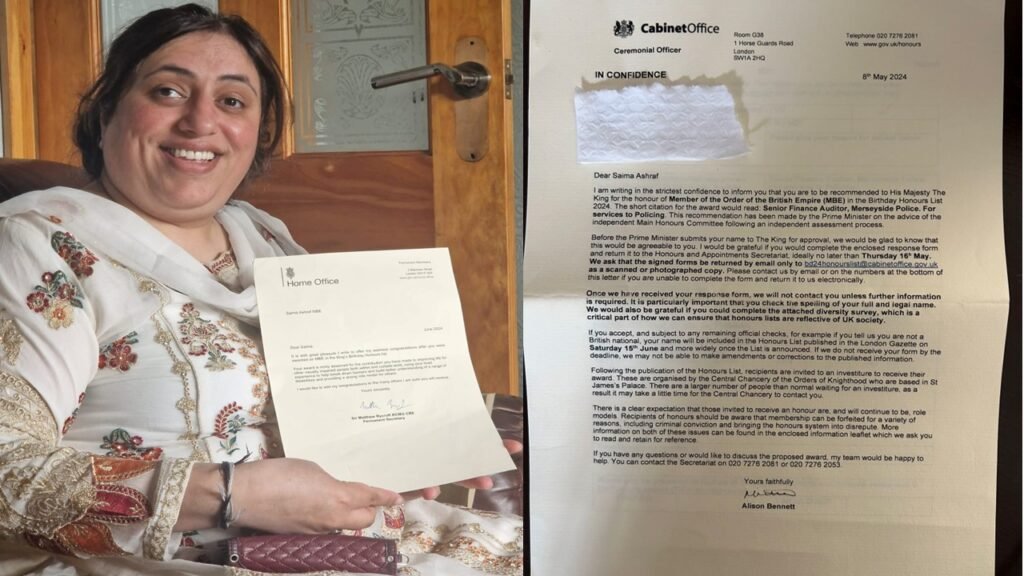

Receiving that peer recognition after years of hardship and being written off due to being blind; meant the world to me. The biggest joy came when I told my parents; as I am from a working class background; my father migrated to the UK in 1969 (as an economic migrant) aged 15 to work in the cotton mills as a Weaver. To see his reaction (in the year where it has been 55 years since he migrated), to be able to tell him that I would like them to accompany me to Buckingham Palace to collect my award was just amazing (we will be going on the 18th of Dec 24 to collect).
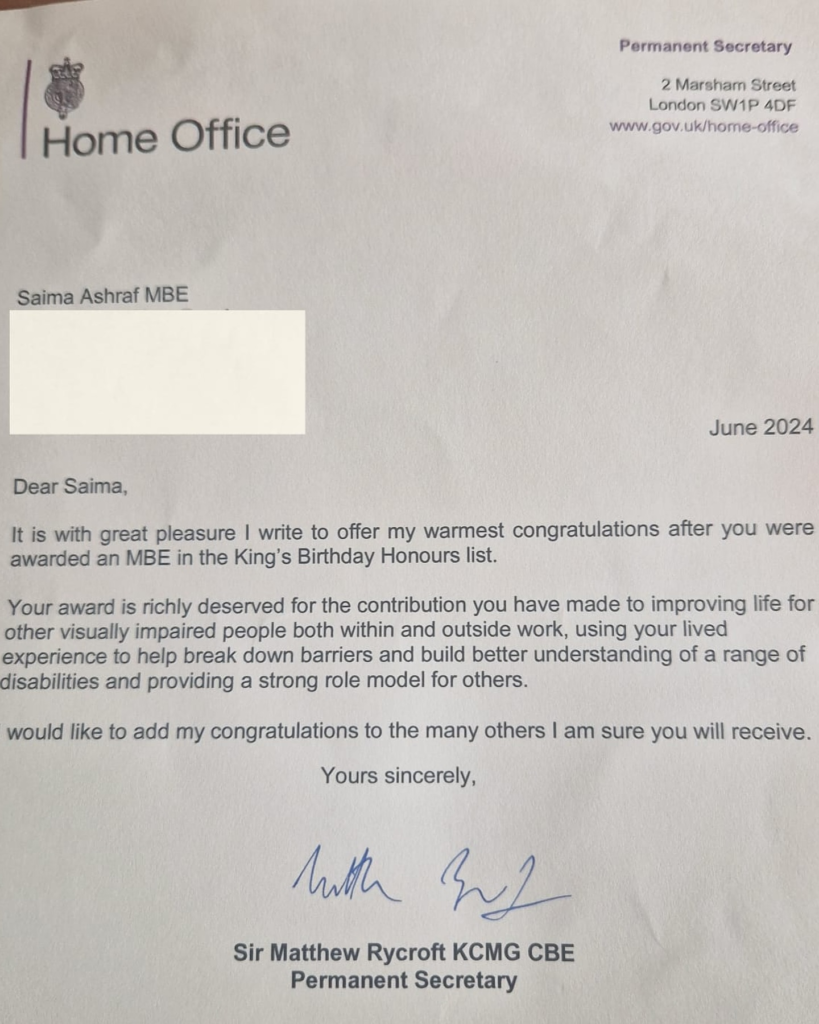
Dr Shabana Parvez: Saima, your journey has been incredibly inspiring. Can you share how you found the strength to overcome the challenges of sight loss during your teenage years?
Saima Ashraf: My teenage years were particularly difficult, I felt as if everything I loved had been snatched away from me over night. I loved playing sports, riding my bike and was a advanced reader; so suddenly when I was struggling to do this I felt so angry. I remember sitting in my bedroom looking out the window and resenting the other children on the street, I was so angry why this condition had affected me and no one else. In our family no one had the condition and so for me to get it felt like the worst luck in the world.
I was surrounded by extended family who made comments to my parents such as your daughter is a burden, no one will marry her etc. this made me feel like I had to protect my parents and not show them how I felt and how devastated I was.
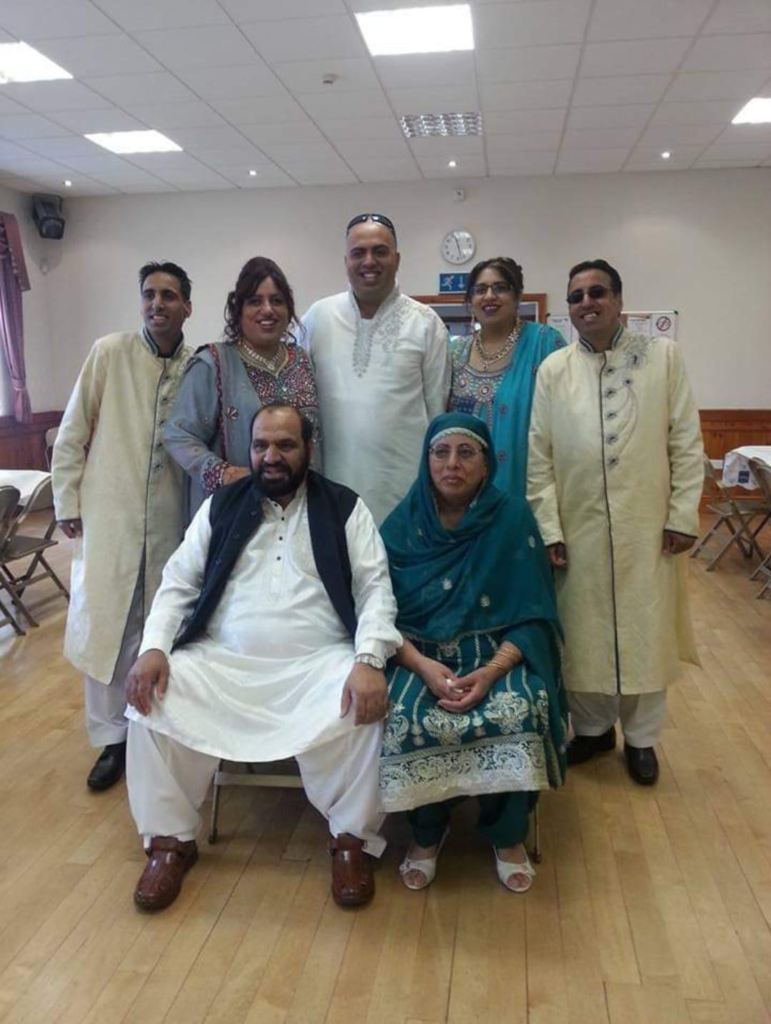
Then a couple of things happened which changed my life, firstly my parents decided to take me on pilgrimage in Dec 99 during the blessed month of Ramadan (a huge thing for a practicing Muslim); while we were there my mum told me to dab some Zamzam (blessed water) on my eyes as we believe it has heeling qualities. When I did this one of the staff in the Grand Mosque came to me and asked is something wrong with your eye’s child? I told him yes and he asked which hotel we were staying in, I handed him the card and he asked who is your male chaperone? I explained it was my father and he said he would be in touch; the following day in the hotel we received a call asking for my father to go to reception. I immediately knew this must be the member of staff, so I told my mum we must go down too as my father will not recognize him.


When we went to the reception it was him and he had a carrier bag with him and said there are millions of people here on pilgrimage right now, I don’t know why I felt I needed to come to you, but I have a gift. When I opened the bag I found a bottle of water and he explained during Hajj when they change the cover of the Kaaba they use Zamzam to wash the walls and this bottle contains that Zamzam; he then opened an envelope and handed me a piece of cloth and explained each year the cover of the Kaaba is changed too and this is a piece of the cover. As a Muslim receiving either of these gifts is deemed to be a huge matter, this is when I reflected and realized when I’ve been feeling so alone and lonely there is divine being watching out for me (I know for those who are not of faith may struggle with this but this experience changed my life and lifted me out of the depression referred to above).
I was also blessed to have an amazing Uncle who has been my rock in life, aged 16 when I was struggling with the decision of what to study; as I had always wanted to be a lawyer and having acquired sight loss I knew I would struggle to read as I didn’t use brail and screen reader technology was not as sophisticated as it is in 2024. So my Uncle suggested I’m so good at Math’s, why don’t I study A Level Accounting and see if this could be a career of choice. This is when I studied this and fell in love with the profession and wanted to continue studying this field. I felt that I need to take the negativity put on me for being visually impaired and channel it into a positive and show these people that I will achieve something even though they have written me off for something I have no control over.

Dr Shabana Parvez: You faced significant obstacles on your path to becoming a chartered accountant. What kept you motivated throughout your academic journey?
Saima Ashraf: Firstly, my family and Uncle (referenced above); their belief in me and pride in what I was trying to achieve kept me going. When the world kept saying I can’t do something they gave me the will to continue and then after a while I was too far into studying the professional exams that I couldn’t stop. My BA Hons in Accounting and Finance was worthless unless I completed my professional exams and qualified. So, at every hurdle I came up with the solution in order to allow me to continue.
Dr Shabana Parvez: Can you talk about a specific moment in your life where you realized your vision impairment would not define your capabilities?
Saima Ashraf: During my school life I did not receive much support as I was not diagnosed at this stage and had not been registered blind. My sight had started to deteriorate, so I was struggling to see the board and read textbooks but was not eligible for support until year 10 (aged 15) of high school. Even then the support offered was based on the needs of other visually impaired children; the issue was their visual impairment was less severe to mine and so the adjustments made for them were not good enough for me. This meant I ended up taking my GCSE’s based on memory from what I had heard in class, the life changing moment was when I received my GCSE results in the summer of 99 and found I had obtained 9 A-C GCSE’s grades. This is when I realized regardless of the sight loss I am still able and capable of studying.
Education and Professional Growth
Dr Shabana Parvez: As the first blind student at Lancaster University’s Management School, how did you advocate for yourself and your needs to ensure a supportive learning environment?
Saima Ashraf: During my time at Blackburn College, I evolved as a disabled person and became extremely confident with regards to my disability. Therefore when I arrived at Lancaster University in Sept 2001 I organized a meeting with the Head of Accounting and Finance, the Disabilities Student Officer and a representative from the Royal National Institute for the Blind (RNIB); at this meeting I set out to the department what I needed from them in relation to support needs over the next 3 years e.g. lecture slides being provided electronically so I can listen to them using my screen reader or lecturers being made aware that there is a blind student in their class so that they are more descriptive when teaching which would assist me in understanding.
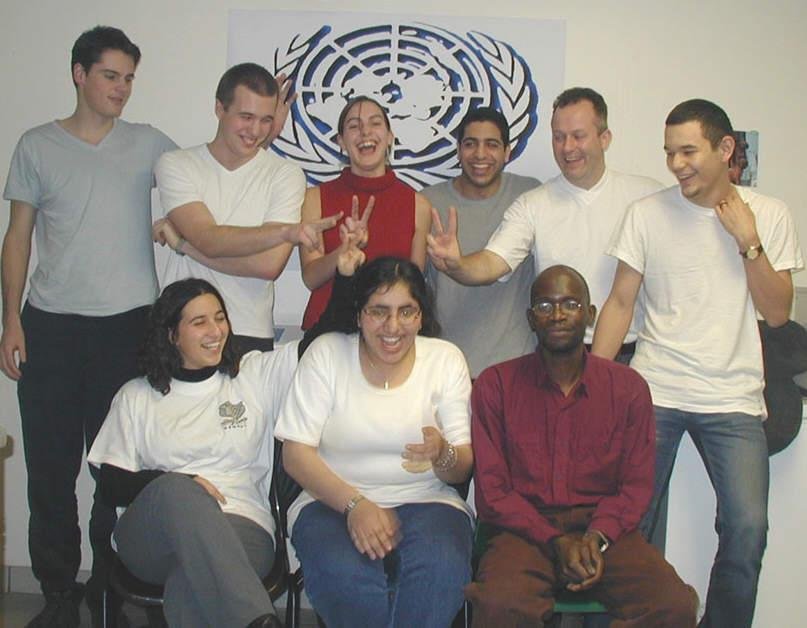
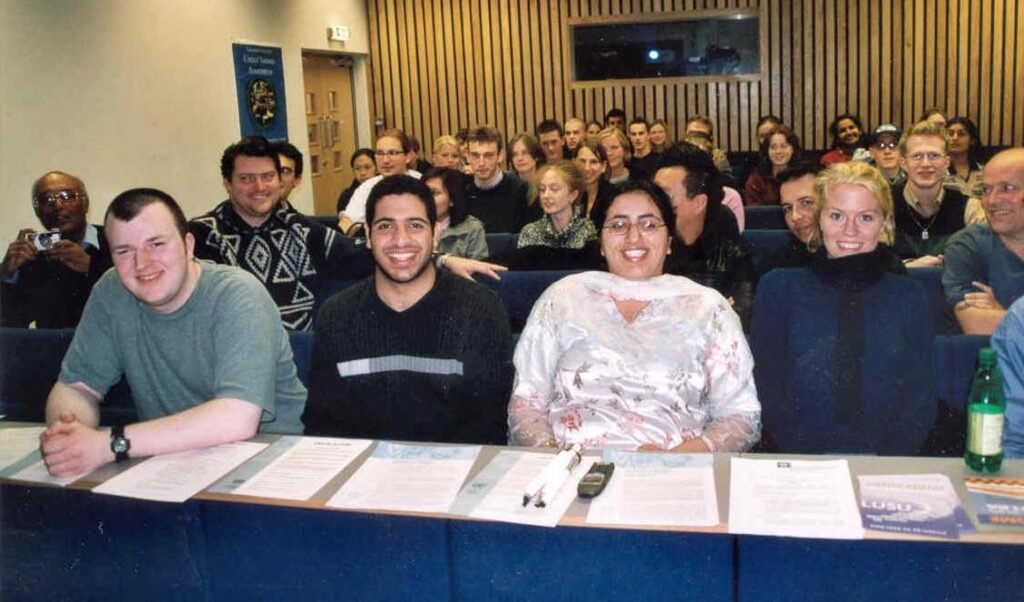

I am very pleased to say the University were extremely forth coming and implemented all suggestions, fully supported me over the years allowing me to study and achieve a 2:1 degree classification.
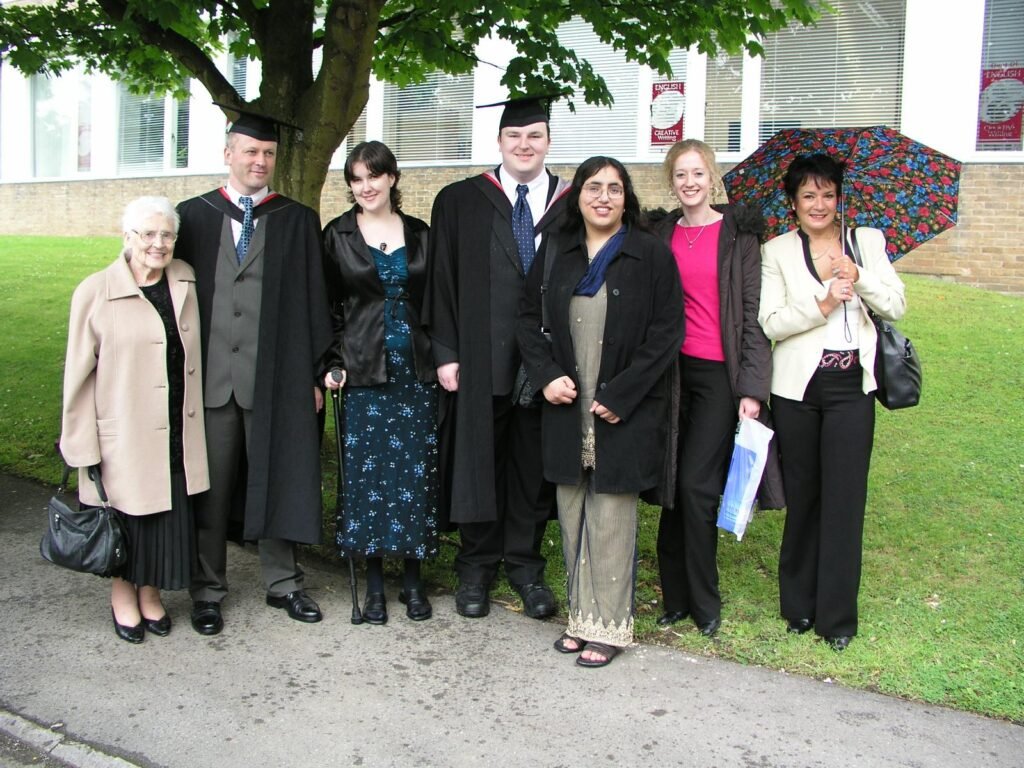
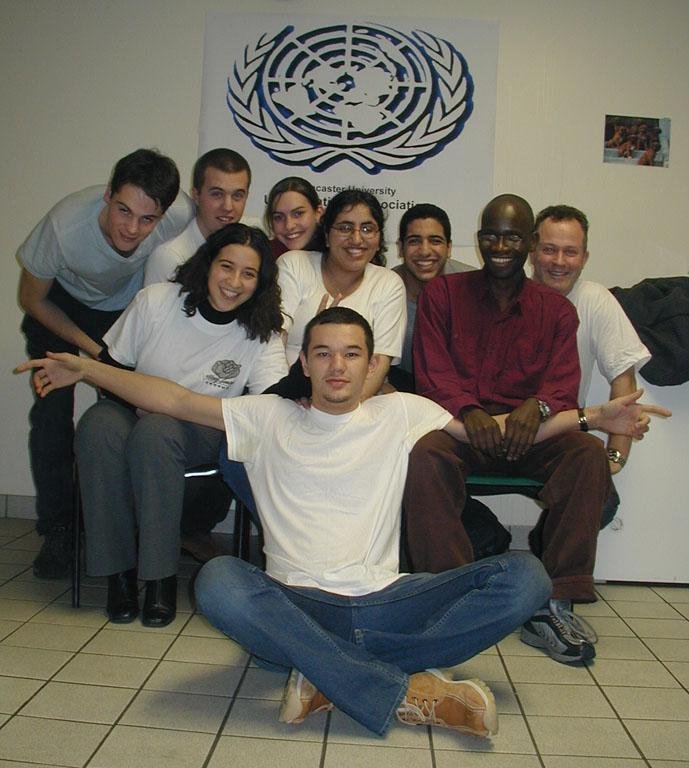
Dr Shabana Parvez: What impact did your university experience have on your confidence and professional aspirations?
Saima Ashraf: I can accredit the University to be the one who put me on the path of a career in audit; in my final year during freshers week (Sept 2004) we were invited to a lecture named the ‘wakeup call’; when I went to this I thought we would be lectured on the fact that this is your final year and you all need to study hard etc. when we went into the lecture, the first thing asked was what are you planning to do this time next year? They explained how companies recruit a year in advance for graduate trainee programme, so if we want employment for the following year we need to apply now. In addition the Auditing module was taught by Director from KPMG, in order to prepare us for the assessment process he ran practice assessment centers and educated us on competency based interviews. With all this support me and all my friends had secured graduate trainee programme by the Christmas of 2004.
Dr Shabana Parvez: You navigated a demanding path to becoming the first registered blind Chartered Public Finance Accountant. What advice would you give to others facing similar challenges in their careers?
Saima Ashraf: It was the hardest journey of my life, but they need to understand it always takes one person to break the glass ceiling, which becomes the defining point for others to feel encouraged to do whatever they want. I believe we can do anything we decide to put our mind too, the sky is the limit.
Community Involvement and Impact
Dr Shabana Parvez: Your initiative in organizing donor drives for blood cancer patients is truly commendable. What inspired you to take that action, and what impact do you feel it had on your community?
Saima Ashraf: I was listening to the radio whilst working and my sister was sat with me; I heard the mother sharing how her son had suddenly fallen unwell and after months of tests he had been diagnosed with blood cancer. I remember turning to my sister and saying the child was same age as her daughter and this could be u one day. So, I decided to call the studio and find out how I can assist.

They explained I need to organize a donor drive to find a match for the child. Whilst planning this I heard a successful drive is where 100 people register; I felt this was not good enough as we had 6-8 weeks to identify a match. So I decided to target Friday prayers at the local mosque (anywhere a large ethnic minority community gathered), this took off and other people started doing this in Manchester/Leeds. I then heard the superstar Rahat Fathi Ali Khan was coming on tour, I decided to contact his promoter and persuade him to conduct drives at the concerts.

Thankfully he agreed and, over the 8 weeks a couple of thousand people registered on the Delete Blood Cancer register. We did not find a match for the child in question but his father’s cells were used instead and thankfully he was cured. The following year in 2014 I received a letter from Delete Blood Cancer informing me that in the last year from the people who registered via our efforts 7 donors had matched.
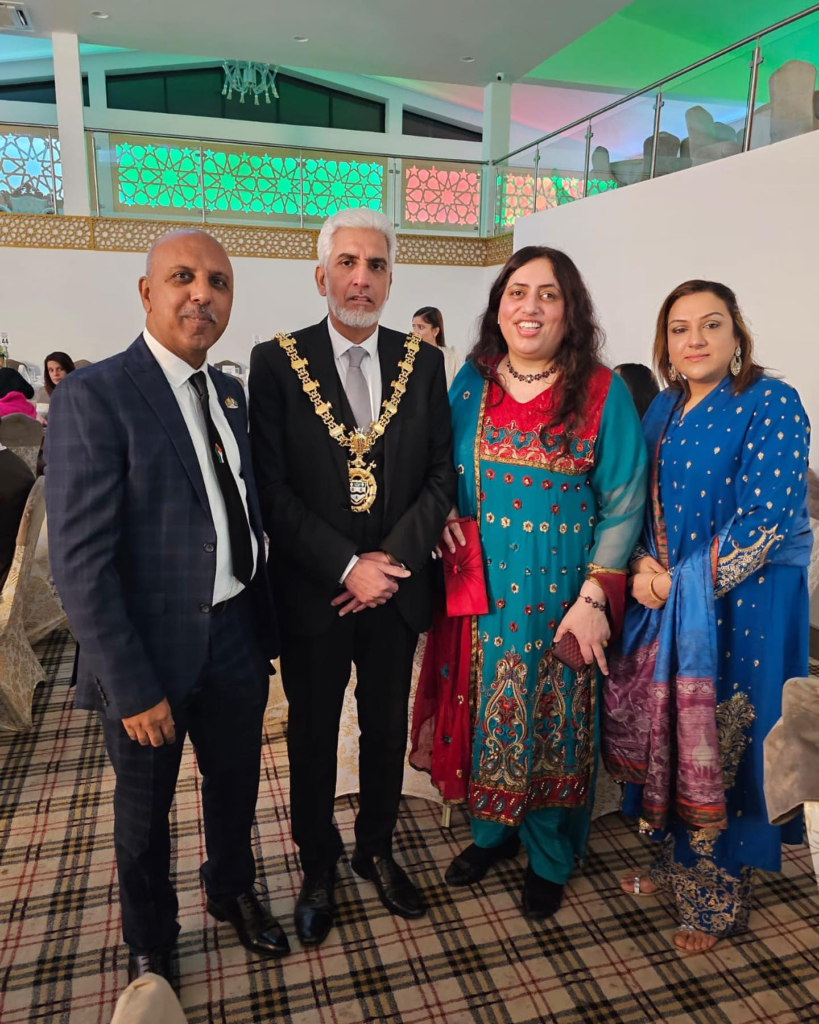
I believe our work and efforts generated a lot of interest and awareness for people to understand the need for being on such registers, as minority ethnic people usually are reluctant to join but we all need to remember tomorrow we may be the ones needing the donor. This was the most humbling moment for me, as people always think charity can only be given by donating money. This whole exercise taught me God has given us a lot more to give and we need to strive to leave a legacy in this word and make a difference.
Dr Shabana Parvez: As a Governor of St Vincent’s School for the Sensory Impaired, what are some of the most rewarding experiences you’ve had while working with the children there?
Saima Ashraf: Using Mobility aids is a luxury in our country, this was highlighted when in 2019 we had a delegation of blind children and teachers visit us at the school. They came for a 6-week residential and we had collaborated with Liverpool John Moore’s University (LJMU) to create a mobility qualification which would teach the children independence skills. On one of the first weekends when they arrived the children were asked what activity they would like to do; seeing as they were in such a huge footballing city I assumed they will ask for a visit to one of the football clubs.

When they responded I was shocked, they told the interpreter could we organize some way that they could run. Initially I was baffled, but then it dawned upon me that in Indonesia these children are treated the same as I am when I visit Pakistan and they are not given the chance to run around and play like their sighted counter parts. So, we booked a running track in a park and organized for a sister school to join us; where sighted children held the hands of the visually impaired children and ran. The joy this simple act brought to those children is something I will never forget and is something which made me appreciate how we have so many blessings in our lives yet still remain ungrateful.
Dr Shabana Parvez: You’ve been a vocal advocate for visually impaired individuals. What changes do you hope to see in society regarding accessibility and inclusion?
Saima Ashraf: My biggest dream is to live in a society where people don’t see me as a blind person but see Saima Ashraf first. I feel as soon as people meet me, they have preconceived notions of how I should look or what I can and can’t do, I wish we lived in a society where I was still treated as an equal to sighted people and was given the same level of respect as others. Sometimes no matter what I have achieved I am still subjected to narrow minded views, stereotypes and prejudices people have which become challenges and barriers to my independence. Where I believe the way I live my life and do so much is clear evidence to the contrary, some people d acknowledge this and say ‘you see more than sighted people’.
Achievements and Recognition
Dr Shabana Parvez: You’ve won numerous awards, including the Employee of the Year at Merseyside Police. What do you believe has been the key to your success in these roles?
Saima Ashraf: Merseyside Police has been an extremely supportive employer, I have had fantastic line managers over the last 11 years who have not only fully supported me in what I want to do but have mentored me to progress in my career in audit. It is this support which has allowed to be the Chair of the Disability Support Network for the last 3 years and represent Merseyside nationally on the Disabled Police Association (which has oversight over all 43 police forces in England); as well as working as a Senior Auditor.
Dr Shabana Parvez: How do you plan to use your platform and recognition to inspire others, particularly in the blind and disabled communities.
Saima Ashraf: My main objective in life is to inspire and empower others, I do this by being a ambassador and example to all visually impaired people; that there is life after sight loss. The way society makes us feel that the world has ended is wrong and with the right tools and support we can achieve anything. Therefore, I do this by doing activities which people think a blind person can’t do e.g. flying a two seater glider plane, climbing a 500 foot rock face with a waterfall to go and sit under the water coming over the rocks.
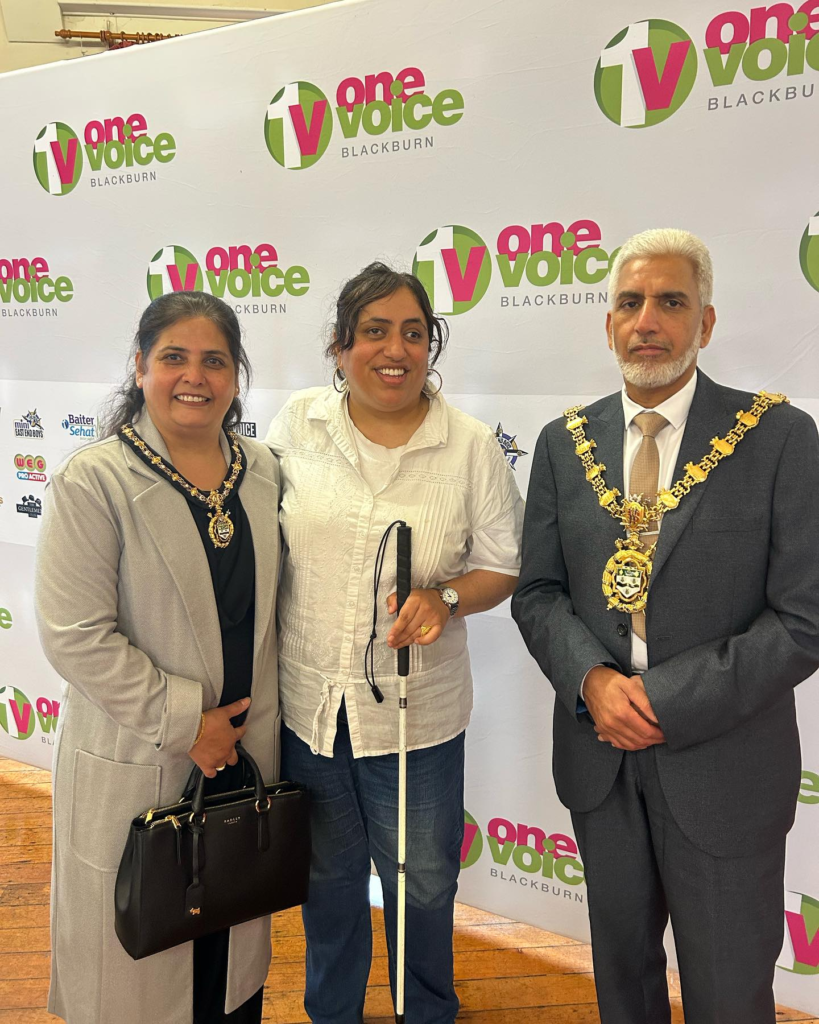
I also am part of a podcast made up of blind/visually impaired individuals from a black, Asian and minority ethnic background name Eye Believe (available on Spotify). We speak about generic topics but give the unique perspective, challenges and barriers we face being from such communities.
I live independently on my own (by choice), travel on trains all over the UK alone and have been abroad alone too, this is to empower others to feel they can do this too.
Future Aspirations
Dr Shabana Parvez: Looking ahead, what are your goals for the future, both personally and professionally?
Saima Ashraf: Having lost my sister to pancreatic cancer I would like to continue all the charity work I do under the umbrella of a charity named Misbah (after my sister), the main slogan will be lighting the path of the forgotten people (Misbah is a word for a lamp in the Quran, hence this slogan and the forgotten people are disabled people who in our Community are treated like a lesser class). The plan is to continue to share my journey so that I can continue to inspire and empower others.
Dr Shabana Parvez: What initiatives or projects are you currently involved in that you’re particularly excited about?
Saima Ashraf: Recently I have launched a blind baseball team named East Lancs Legends, I felt I have achieved so much but sports is still missing in my life. I tried a number of blind sports, but then decided blind baseball gave me the opportunity to run and play independently without needing a sighted guide or cane. Our team is affiliated with UK Blind Baseball Federation and recently I visited Italy to receive training from the former World cup champions, current silver medalists (as they have had the game in their country for nearly 20 years). Once again wanting to encourage others to have the belief that they have a lot to live for and contribute into society.
Dr Shabana Parvez: If you could offer one piece of advice to young individuals facing disabilities, what would it be?
Saima Ashraf: Don’t take other opinions of you and adopt them as your beliefs, when the world writes you off one needs to write there own destiny. You are all the authors of your own legacy, we are here once make it count.

